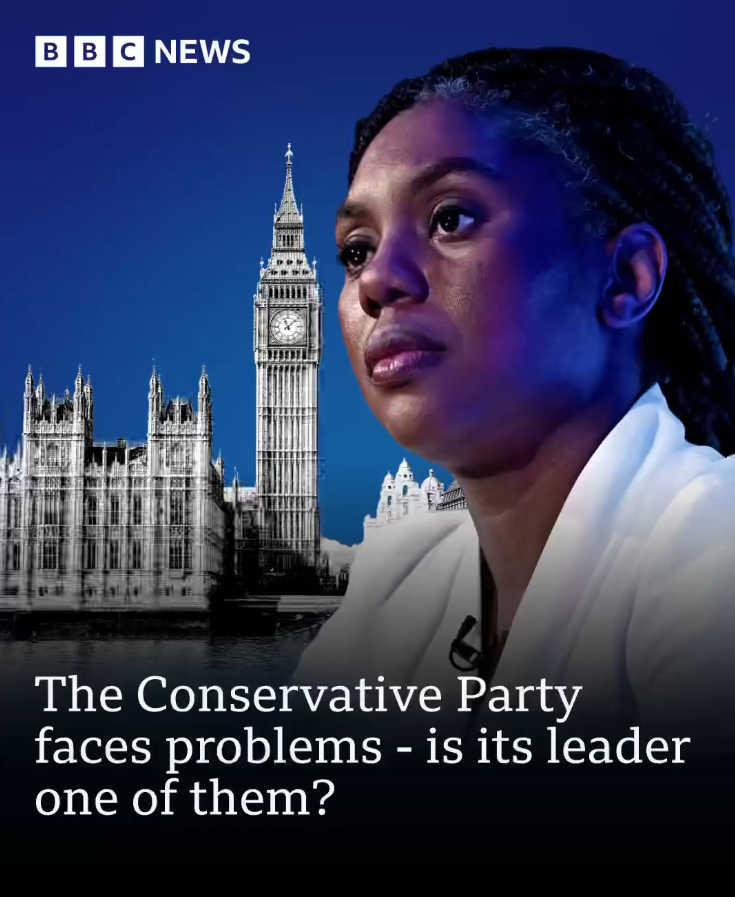
Kemi Badenoch, the leader of the Conservative Party and once hailed as a rising star of British politics, is facing mounting criticism from within her own ranks. Senior party insiders have described a series of recent missteps under her leadership as a “total disaster” for the Conservative Party, raising serious questions about its direction, unity, and ability to recover from plummeting public support.
Badenoch, who took over as leader following the resignation of Rishi Sunak in the aftermath of the Conservatives’ 2024 general election defeat, was initially seen as a bold choice. Her sharp rhetoric, confident public persona, and strong stances on culture war issues made her a favourite among grassroots members. But less than a year into her leadership, discontent is brewing — not only among backbenchers but also among ministers, local councillors, and longtime party strategists.
“She came in with a lot of energy and support from the right of the party,” said one senior Tory MP speaking on condition of anonymity. “But the way she’s handled internal disagreements, her public messaging, and some of her key decisions have been a total disaster. We’re losing ground not just with the centre but with our core voters too.”
Culture War Over Strategy

One of Badenoch’s central missteps, insiders argue, has been her prioritisation of divisive cultural issues at the expense of economic recovery and public services — areas where voters are demanding action. While her speeches on free speech, identity politics, and “woke overreach” have garnered headlines, critics within the party say they do little to address the real concerns of working families and business owners.
“There’s nothing wrong with standing up for principles,” said a former cabinet minister. “But when you’re in opposition after a crushing election loss, your priority should be rebuilding trust, not doubling down on rhetoric that alienates half the country.”
Her confrontational style, particularly in media interviews and in Parliament, has also ruffled feathers. While it may appeal to a section of the base, others see it as unnecessarily combative and damaging to the party’s long-term image.
Internal Party Struggles
Perhaps more damaging than her public posturing has been the growing perception of disarray within the Conservative ranks. Reports of factionalism, purges of moderate voices, and a breakdown in communication between the leadership and local constituencies have created a climate of unease.
In April 2025, the resignation of three senior shadow ministers — citing a “lack of direction” and “inability to collaborate” — dealt a blow to Badenoch’s claims of party unity. The leaked minutes from a shadow cabinet meeting in May further revealed frustration over a leadership style described as “isolated and dismissive.”
“You can’t lead a major party like it’s a personal brand,” one source said. “Politics is about consensus-building. Right now, we’re tearing ourselves apart.”
Electoral Setbacks and Polling Woes
While internal tensions are damaging, the external signs of decline are just as concerning. Under Badenoch’s leadership, the Conservatives have continued to struggle in the polls. A recent YouGov survey put the party at 19%, trailing Labour by nearly 25 points and losing ground to the Liberal Democrats and Reform UK.
Local elections in early 2025 confirmed these trends, with the Conservatives suffering widespread losses in areas previously considered safe. Many Tory councillors, some of whom lost their seats, pointed fingers squarely at the national leadership.
“She’s talking to the base while the rest of the country is moving on,” said a defeated Conservative candidate from the Midlands. “People are worried about rent, schools, the NHS. They’re not interested in ideological crusades.”
Missed Opportunities
Insiders also highlight specific policy missteps. Badenoch’s proposal to scrap net-zero targets — intended to appeal to sceptics of climate policy — ended up alienating younger voters and business groups who had already invested in green initiatives. Her pushback against expanding childcare support and housing reform has been met with similar criticism.
“These were golden opportunities to rebrand the party as forward-thinking and practical,” said a former policy adviser. “Instead, we’ve looked regressive and out of touch.”
Her handling of foreign policy has also been questioned, particularly after a clumsy attempt to reframe Britain’s position on the Ukraine conflict led to confusion and criticism from allies.
Hope or Hard Reset?
Despite the growing criticism, Badenoch retains a loyal faction within the party, especially among members who admire her combative style and willingness to challenge orthodoxy. Some argue that the backlash is part of a broader struggle between the party’s ideological wings — a battle that has been brewing since the Brexit vote.
Still, the murmurs of a leadership challenge are becoming harder to ignore. Speculation is rife that a group of moderate MPs is already discussing alternatives, hoping to initiate a reset before the next general election, expected in 2029.
“The clock is ticking,” said a veteran party figure. “If we don’t turn things around by the end of the year, we risk becoming irrelevant.”
Looking Ahead
Kemi Badenoch remains defiant in the face of criticism. In a recent interview, she dismissed internal grumbling as “the usual Westminster games” and insisted that the party must stay true to its values. But with sliding poll numbers, rising internal revolt, and a disillusioned electorate, her leadership faces the ultimate test: can she evolve and unify the party, or will she be remembered as the leader who steered the Conservatives further into political wilderness?
For now, the verdict among many insiders is clear — unless major changes are made, the current direction is not just a misstep but a path to disaster.



